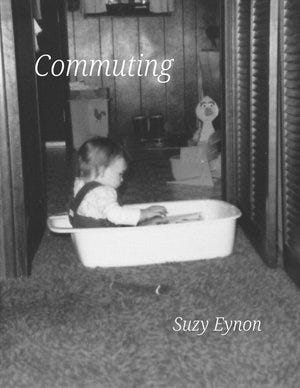A simplicity is accessible from Suzy Eynon’s Commuting, a flash-fiction series, like a bus stop a block away. Eynon writes stories that “stay in the back of your throat like a truth” and are “made of that dirt we call earth” (Philip Levine, “The Simple Truth”). However, beneath these earthly observations, an intricate psychosomatic world naturally unfolds.
I grew up in Florida but spent time throughout the US, where public transportation is hazardously underfunded or, in many cases, nonexistent. Seattle, although not in the same class as New York, has a semi-functional system of transportation. But it is always astonishing the degree to which public transportation is neglected in the United States.
The silent but veritable war waged by oil companies against public infrastructure, and sustainable methods of transport, drones on as background noise reading through this collection of stories, and Eynon’s clear-eyed observations remind us that the commute, for Americans, can be a supremely alienating experience as a result. This conflict is the latent context humming under the speaker's various encounters: For example, Eynon captures malaise and discomfort on the 6 am bus, crowded with people: “I think it fully reasonable that occasionally a fellow passenger vomiting or the bus breaking down just south of the bridge causes me to not be at my desk at 7:55 am…” Such an experience is the graphic crescendo of a morning commute. The rest of the day at work can only descend from the proverbial Mount Etna.
Alongside graphic descriptions, the speaker recounts “battl[ing] demons to board a crowded bus during a pink sunrise,” “just as street lights wink off”. These dashing lines ease the discomfort of the morning bus. But, can anything really shelter against the rubber-marred streets, which the speaker begins with in many of the stories? To deal with these streets, the speaker relies on trusty superstition, riding a bus over a bridge: “I used to suck in my breath as the bus crossed onto the bridge, exhale at the clunk-clunk of its return to regular road. Now I don’t bother, have formed new superstitions.” The speaker in half of a sentence suggests a whole supernatural realm that insulates the psyche. For Eynon, the half-sentence summons a superstition that is absorbed from the streets to the body to the super-structural world.
Eynon observes subtleties in the daily commute: a “child’s sneeze explodes into the air”. A note silently drinks mud on the floor of the bus for days. The message scrawled on it (“All screw up”) “gathers to a greatness” as it finally surprises the speaker with its sage cynicism. Eynon’s work transforms the quotidian into a font of over-signification and, as Eavan Boland’s poetry once declared, the “trash bins begin to glow.” The alienation of the speaker is distributed across the way in unlikely symbols and synergies.
Eynon’s book fuses the incidental into an epic journey of everyone, in the digital age, goaded by Menaeleus then, and now their bosses, onto a concrete Odyssey. But, instead of the Sirens, an old air vent in the office hisses up dust. Taking the bus in the United States is a Sisyphean task, one that Eynon deftly shoulders.
Commuting
By Suzy Eynon
Published by Ghost City Press
12pgs
PDF | Summer 2024 | Summer Micro-Chapbook Series | $0.00
Andrew Rader Hanson is a poet from South Florida. His work has been published by Spectrum Literary Journal, Pembroke Magazine, The Hong Kong Review, and more. He is the author of THIS WAREHOUSE MANUFACTURES THIRST (Bottlecap Press, 2024)






